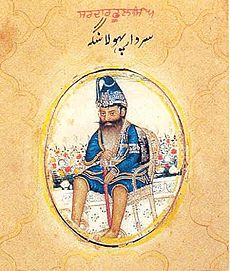Akali Phula Singh | |
|---|---|
 Portrait of Akali Phula Singh[1] | |
| Jathedar of the Akal Takht | |
| In office 1800–1823 | |
| Preceded by | Jassa Singh Ahluwalia |
| Succeeded by | Hanuman Singh |
| 6th Jathedar of Buddha Dal | |
| In office 1800–1823 | |
| Preceded by | Naina Singh |
| Succeeded by | Hanuman Singh |
| Personal details | |
| Born | Phula Singh 1 January 1761 Shihan[citation needed], Phulkian Misl, Sikh Confederacy (present-day Sangrur district, Punjab, India) |
| Died | 14 March 1823 (aged 62) Pir Sabaq, Sikh Empire (present-day Khyber Pakhtunkhwa, Pakistan) |
| Cause of death | Killed in Action |
| Parent |
|
Akali Phula Singh Nihang (born Phula Singh; 1 January 1761 – 14 March 1823) was an Akali Nihang Sikh leader. He was a saint soldier of the Khalsa Shaheedan Misl[2] and head of the Budha Dal in the early 19th century. He was also a senior general in the Sikh Khalsa Army and commander of the irregular Nihang of the army. He played a role in uniting Sikh misls in Amritsar. He was not afraid of the British who at many times ordered for his arrest but were not successful. During his later years he served for the Sikh Empire as a direct adviser to Maharaja Ranjit Singh. He remained an army general in many famous Sikh battles up until his martyrdom in the battle of Nowshera. He was admired by the local people and had a great influence over the land[3] and his settlement was always open to help the poor and helpless.[4] He was well known and was a humble unique leader and prestigious warrior with high character.[5][6] He was also known for his effort to maintain the values of Gurmat and the Khalsa panth.
- ^ Singh, Bishan (1973). Twarikh Guru-Ka-Bagh (Third ed.). Amritsar: Shiromani Gurdwara Parbandhak Committee.
- ^ Singh, H.S. (2008). Sikh Studies, Book 7 (Fifth ed.). New Delhi: Hemkunt Press. p. 36. ISBN 9788170102458.
- ^ Griffin, Lepel (1873). The Rajas of the Punjab: Being the History of the Principal States in the Punjab and Their Political Relations with the British Government (Second ed.). London: Trübner & Co. p. 319.
- ^ Singh, Prem (1926). Baba Phoola Singh Ji 'Akali' (4th ed.). Ludhiana: Lahore Book Shop. p. 36. ISBN 81-7647-110-0.
- ^ Singh, Jagjit (1998). Temple of Spirituality or Golden Temple of Amritsar. New Delhi: Mittal Publications. p. 43.
- ^ Singh, Kartar (1975). Stories from Sikh History: Book-VII. New Delhi: Hemkunt Press. p. 102.